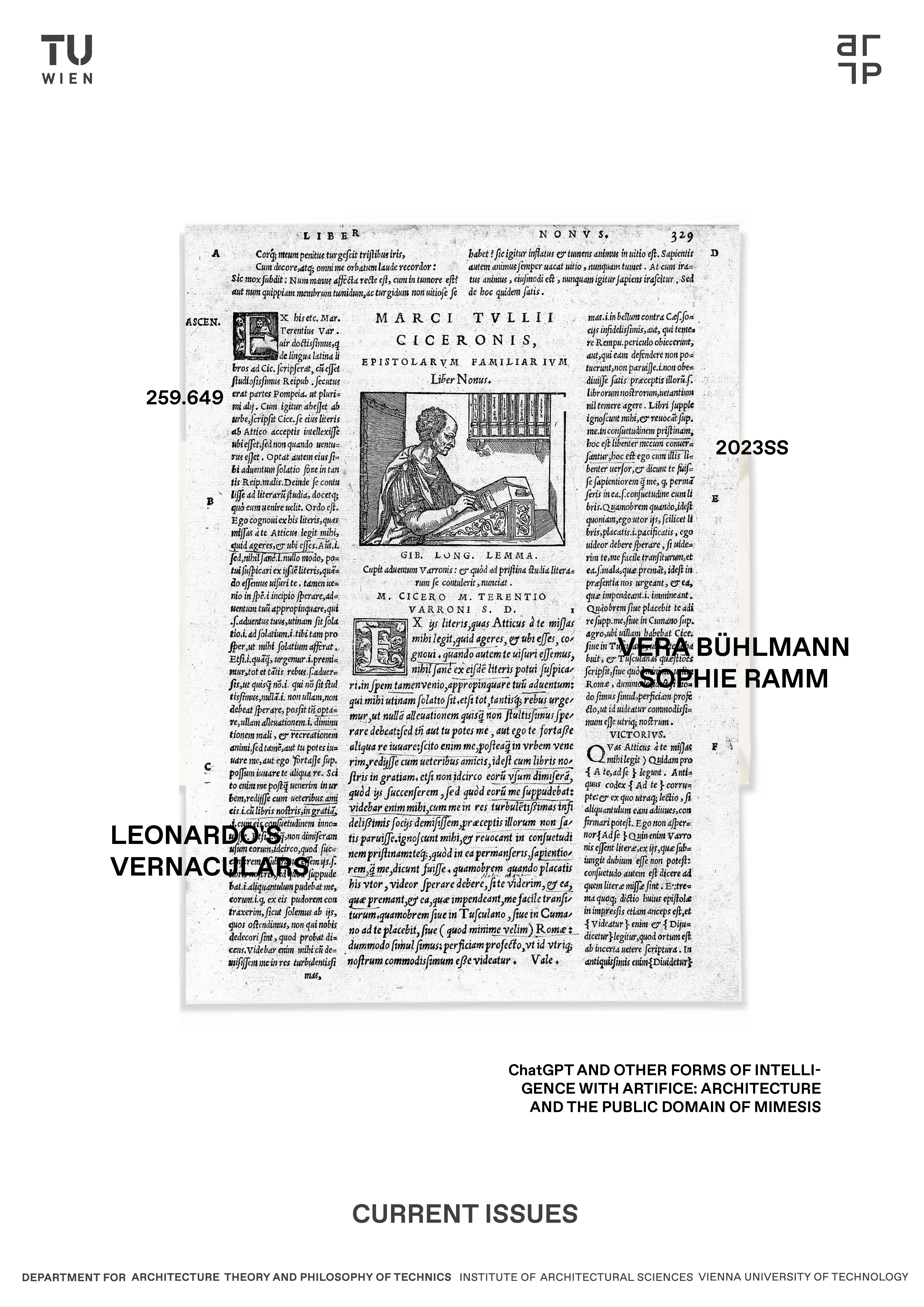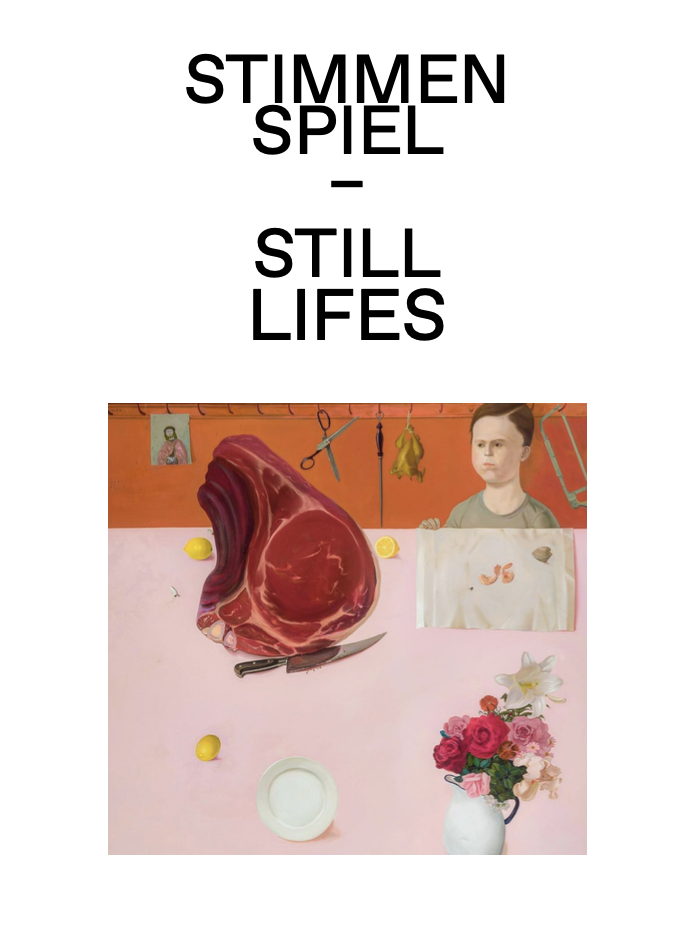
Leonardo's Vernaculars
ChatGPT and other forms of artistic intelligence: architecture and the public domain of mimesis
"Silence," Max Frisch has Hanna, the wife of Walter Faber, say, "Be quiet, it all becomes so small when you talk about it. You talk, but you say nothing."
Does talking inevitably impoverish experience? - it is what Max Frisch explores in Homo Faber, a novel that treats of how the technical, constructive mind has forgotten the richness in experiencing life, because it knows no longer how to talk about it. The mindest of the engineer often wants to reach clarity in thought through stripping all that is decorative; it trusts only in how to speak technically, and hence becomes speechless with respect to what it is capable of – out motto hence: we need something like "Leonardo's Vernaculars".
The advice of Erasmus of Rotterdam, that important scholar in the 16th century whose name is still emblematic to us today of the importance of study trips, cultural exchange and a certain praise of a Renaissance and generalist mindset, was (roughly) this: In order to be able to say something "real", one must know a lot and actively pick up what is already here: one must actively acquire it, grow capable of articulating it with one's own voice. Today, we have largely forgotten the power of mimesis for speaking publicly about reality and the weight of lived experience – this is regrettable.
In this seminar we want to exercise speaking and writing as a craft – publicly, with, through, and in the words that are not owned by anyone, and the voices of the many. We will work with the tools of classical rhetoric and poetics, as well as with Open AI (ChatGPT) and other algorithms: with these, we will try to stir the soil of a digital libraries with books from many times and thematic areas to new bloom and fruitfulness in the light of today.
Leonardo's Vernaculars and tracts of a digital De Officiis Oratoris
From week to week we practice many of the different aspects that interact in the making (fabrication, techné) of speech; we learn formats and instruments, and we compose exercise pieces (called "still lives") and a final "masterpiece." The crafting of these pieces will be followed through the semester in the form of a notebook/tract, and finally submitted as a treatise of a digital De Officiis Oratoris, an advice of our findings addressed to somebody else – along with the exercises.
On the treatise De Offiiciies Oratore: De Officiis Oratoris is the title of a work by Marcus Tullius Cicero, a Roman philosopher, orator, and writer from the 1st century B.C.; it is written in the format of a letter addressed to his son. Cicero was a contemporary of Vitruvius, and Vitruvius "copied" the gesture in his 10 Books. The Latin word officium is composed of opificium, literally for "work-doing," from ops (genitive opis) "power, might, abundance, means" (related to opus "work," from PIE root *op- "to work, produce in abundance") + combining form of facere "to make, to do" (from PIE root *dhe- "to set, put").

What we work with:
- A particular digital library of about 104 books from many periods and topics.
- Online and open AI Augmented libraries like http://nemo.profmrdoyle.com; https://xenotheka.delbeke.arch.ethz.ch
- Imagination
- Technical instruments for composition/writing
- Pleasure in speaking and picturing with words
- Sense of acuteness and critical attention
How we will work:
- In class group conversations
- Week to week writing exercises
- Audiovisual documents to be seen outside class time.
- Optional Sprechstude-meetings outside class time to prepare the exercise and master pieces that each student is submitting at the end of the course.
Mondays 10:00 - 12:30, Start: 06.03.20022
at: ATTP Seminar Room (Wiedner Hauptstr. 7, Stiege 2, Stock 1)
Background Literature:
- Jürgen Mittelstraß: Die Sprachlosigkeit der Ingenieure, Leske + Budrich, Opladen 1999.
- Horst Bredekamp, Theorie des Bildakts, Suhrkamp, Frankfurt 2010.
- Horst Bredekamp et.al. (eds.): Das Originale der Kopie, Kopien als Produkte und Medien der Transformation von Antike, De Gruyter, Berlin 2010.
- Jürgen Mittelstraß et.al. (eds.): Wissenschaftssprache, Ein Plädoyer für Mehrsprachigkeit in der Wissenschaft, Metzler, Stuttgart 2016.
- Dante Alighieri, Convivio (1304).
- Plato, Theatetus (3BC).
- Erasmus von Rotterdam, Copia: Foundations of the Abundant Style [De duplici copia verborum ac rerum], (1512).
- Erasmus von Rotterdam, Ciceronianus: Or a Dialogue on the Best Style of Speaking [Dialogus ciceronianus], (1528).
- Cicero, De Officiies Oratoris (1 AE)
Please consider the plagiarism guidelines of TU Wien when writing your seminar paper:
Directive concerning the handling of plagiarism (PDF)